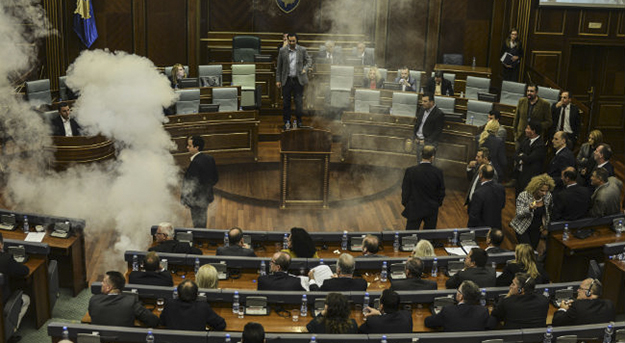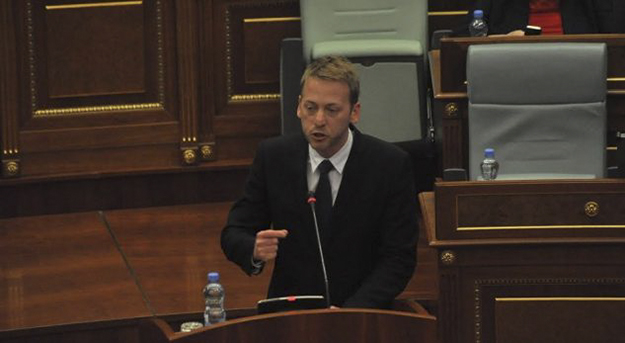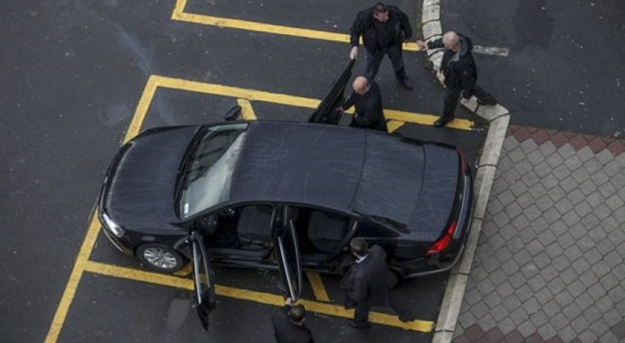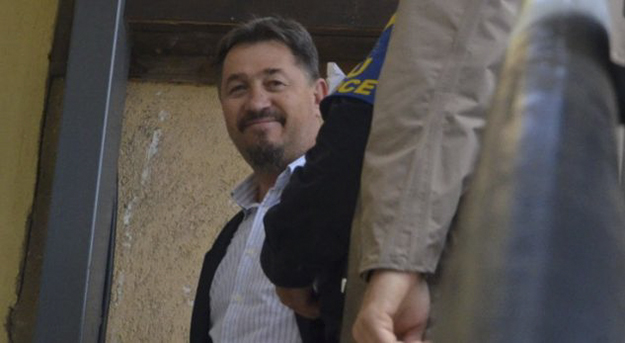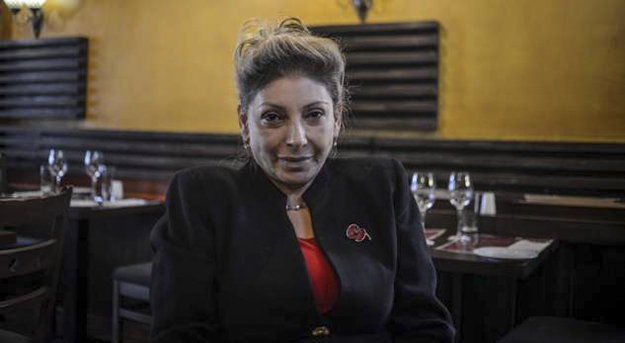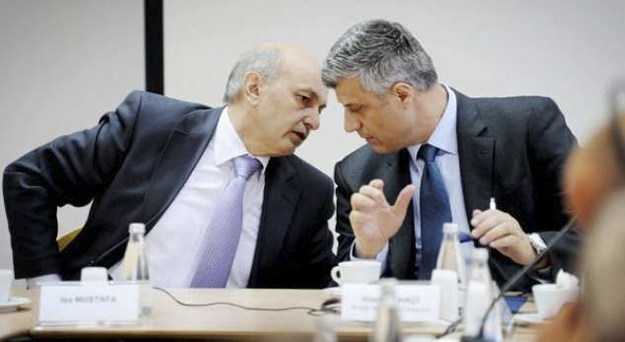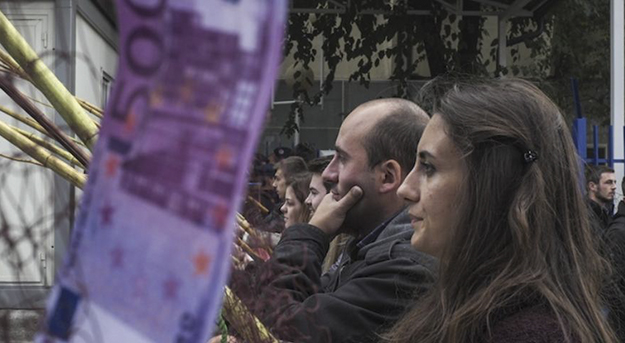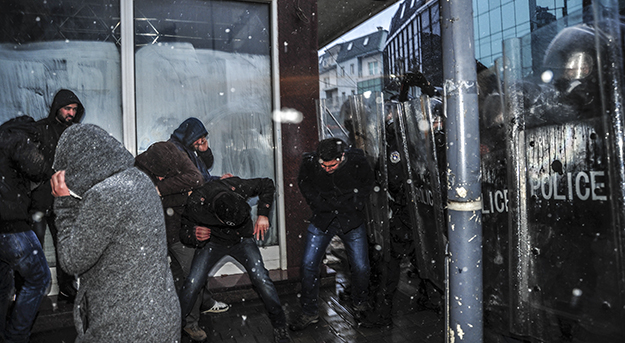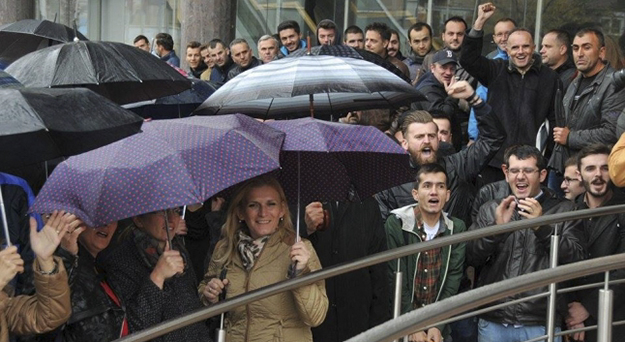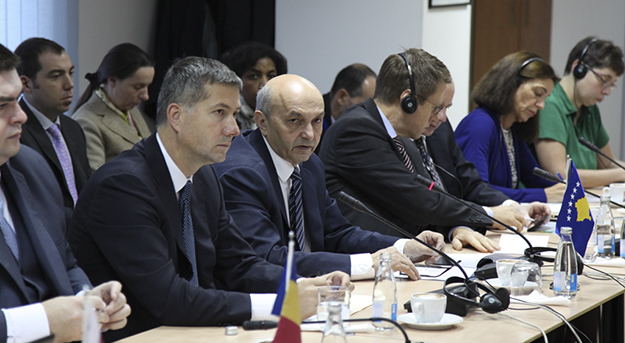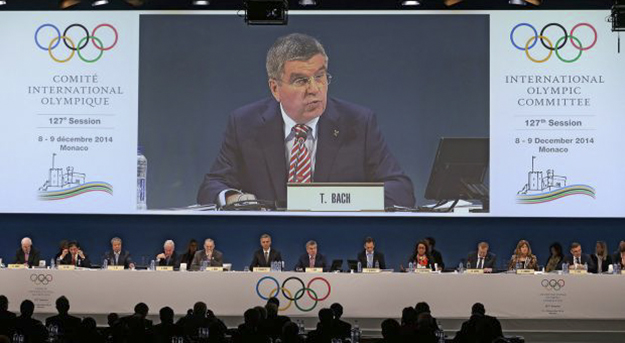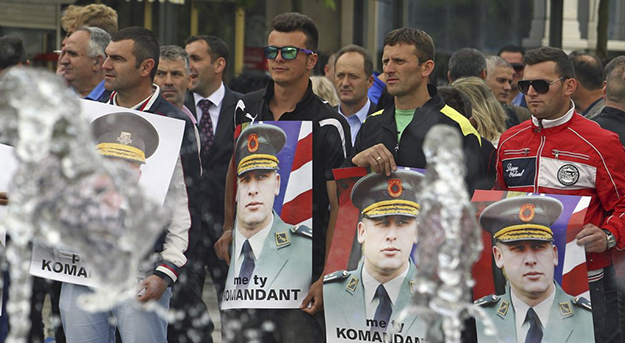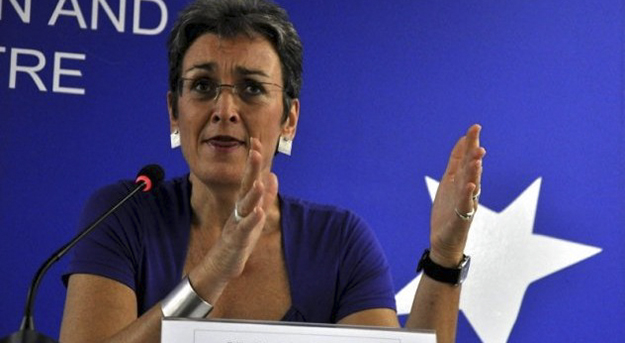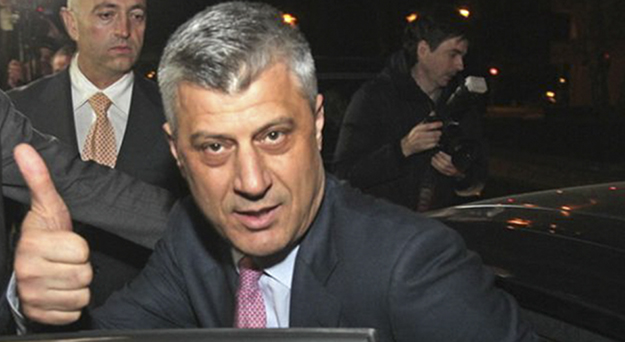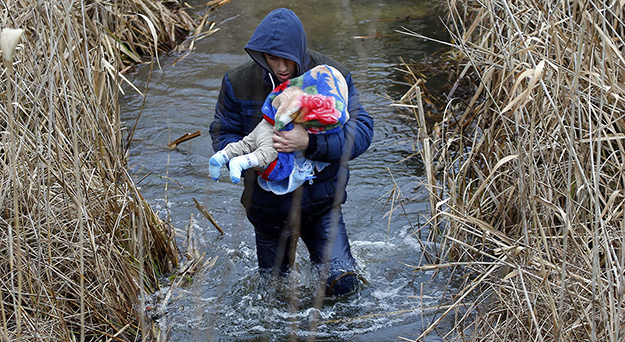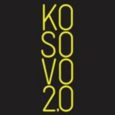Reporting by Cristina Mari, Dafina Halili, Eraldin Fazliu, and William Hammer.
What was happening in January in Kosovo? Do you remember? You were probably starting to make arrangements following your New Year’s resolutions: registering at the gym, quitting alcohol or cigarettes (or other drugs), maybe you even gave a damn about what was happening in this country and thought up your ‘good citizen’ wishlist to contribute to change. Well Kosovo hasn’t exactly been quiet in 2015 (has it ever?). Changes… That’s a great David Bowie song!
Okay, okay, let’s not be pessimistic. It was fun! Lots of people traveled this year from Kosovo. Oh wait, no, they were escaping poverty and only a few gave a shit about them. Ehem. Alright, nevermind, let’s look at things differently.
This year for the first time Kosovo 2.0 has chosen a few categories to revisit the highs and lows of 2015. Can you guess who gets our nod for the very prestigious award of 2015’s Biggest Loser? Who stuck to Kosovo’s people’s interests and therefore got the BFF nomination? And what has barely received a word of coverage but shall be remembered now that we have a fresh year coming soon? For the first time as well, Kosovo 2.0 has elected our Person (or People) of the Year.
Throwback 2015!
1. Word of the Year:
Tear gas: noun — a gas that makes the eyes smart and water, thus producing a temporary blindness, used in modern warfare, to quell riots, etc.
Until now, tear gas is something which has more or less solely been used by police for crowd control around the world. But in 2015, we learned that tear gas can serve politicians just as well as it has served the police all these years. This year in Kosovo saw tear gas move from the streets to the halls of government, and as we have all seen in recent months, it has created quite the splash.
It has seemed at times that the major news stories of the year haven’t been complete until the mention of tear gas has cropped up somewhere. Back in January, the mass protests that eventually caused the sacking of Deputy Prime Minister Aleksandar Jablanovic saw a liberal deployment of the substance on the streets of Prishtina. But ever since its surprising debut on the Assembly floor back in October, when opposition deputies first used it to disrupt a parliamentary session, barely a week has passed without tear gas seeping into the news.
Tear gas in the Assembly, tear gas on the streets, opposition deputies arrested for throwing tear gas, Albin Kurti’s ode to tear gas… Prishtinalis have become so accustomed to the stuff, that they now barely bat an eyelidwhen they see the latest noxious white clouds heading their way.
2. Quote of the Year:
“The suspension of the opposition is the suspension of democracy.” Vetevendosje deputy Ilir Deda succinctly summed up what appeared to be a slide towards out and out authoritarianism after opposition members were suspended from Kosovo’s Assembly, just days after armed police raided his party’s headquarters. The suspension led to countless reactions questioning the level of democracy in the nascent Republic.
Deda expressed his concerns despite the fact that he was not personally suspended, having distanced himself from the tear gas throwing tactics of his opposition colleagues during the three-months-and-counting political deadlock. Nevertheless, he declined to be part of the session while the rest of the opposition were locked outside. The government has now held a number of “government only sessions,” including passing next year’s budget with no opposition present.
Thirteen opposition deputies — more than one third of the opposition — have been arrested due to their alleged roles in “tear gassing” the Assembly, part of ongoing protests against an agreement with Belgrade that would establish an Association/Community of Serb Majority Municipalities and a border demarcation deal with Montenegro.
The situation seems to have all the hallmarks of a dictatorship downloading, except that Prime Minister Isa Mustafa isn’t particularly charismatic, or, well, capable.
3. Scandal of the Year:
For the Prime Minister Isa Mustafa, granting a contract to repair his prime ministerial car to “Mackcar,” his son’s company, was not a “big deal.” However although the contract may not have been for millions, the logic of the prime minister’s response represents all that is wrong with Kosovo’s political elite.
The 2,946 euro contract would probably have been quickly forgotten in Kosovar public opinion, if Mustafa had admitted the error and quickly repented. But instead, he chose to try and justify the decision. Mustafa said that: “I did not know about the tender but I see nothing wrong with it since the car service is authorized.”
Despite the fact that “endemic corruption” was highlighted in the European Commission’s 2015 progress report (and consistently by other relevant institutions over the year), Mustafa does not consider anything wrong with the contract — perhaps something known as a fairly blatant “conflict of interest” Isa?
Pressured by the public, Mackcar decided to withdraw from the contract. Yet, bigger than the amount of the contract is the prime minister’s scandalous logic — it’s good to see that the PM is attempting to combat corruption by leading from the front!
4. Miracle of the Year:
Most people would struggle to continue doing their jobs effectively from a prison cell, but the Mayor of Skenderaj, Sami Lushtaku, has apparently managed to do just that!Despite spending more than half of this year behind bars having beensentenced in May to 12 years in prison for committing war crimes as part of the so called “Drenica Group,” Lushtaku remains in office in Skenderaj’s top job.
We shouldn’t really still be so surprised at the miracle mayor — simply doing the day job while in detention must be a piece of cake, having already run a successful election campaign from a cell in 2013. Lushtaku also proved that he’s a medical miracle in September. While undergoing a check up on his heart at the University Clinical Center of Kosovo, he underwent an incredible recovery to spectacularly disappear and escape without a trace. Sadly for the man who seemed to be able to do anything, European Rule of Law Mission in Kosovo (EULEX) police rapidly recaptured him and returned him to custody. He can satisfy himself with the knowledge that his tenure as mayor goes on… at least until the appeals process is exhausted, at which point the Ministry of Local Administration has said it may step in.
5. Shhh, You Didn’t Hear That…
Do you remember 2014 and that fairly major corruption scandal at EULEX? You know, the one where it was alleged that some EULEX employees had managed to be just as scandalous as the local political elite that they were here to educate. Well don’t worry, we were told that an investigation into the allegations was going to happen… except… whatever happened to that? A report was released into EULEX’s handling of the whole affair back in March, but it was quite clear that this was not mandated to look into the substance of the allegations. Which means, it’s now nine months later… and it’s all gone suspiciously quiet on that front.
Another important issue has been downplayed even though it’s been right in front of our eyes on a regular basis: the Public Broadcaster, Radio Television of Kosovo (RTK). Controversies over censorship at RTK and political interventions by the government have followed its work for years. Just think of those wonderful musical concerts being transmitted every time a riot has swept the country.
Spring saw RTK facing major opposition from inside, when 12 newsroom editors called a protest against the appointment of the new editors in chief, on the grounds of alleged pressure and censorship by the two appointed names. The Independent Union of RTK supported the protest and seemed to initiate a necessary debate when they publicly asked for transparency, an investigation into the spending of public money by RTK’s senior management and called for deputies to sack the responsible managers. RTK eventually decided that they would in fact sack the president and vice-president of the Union, causing outrage and protests, which were supported by newsroom editors and journalists. The upshot: Those controversial editors-in-chief still have their positions, the union leaders have been reinstated and the issue is closed. The censorship at RTK continues to be discussed openly and behind the doors, but the constructive debate on its freedom of speech is still met with indifference in the corridors of power and falls on deaf ears.
As you were, carry on, nothing to see here…
6. Oops, I Did It Again…
Once again, Kosovo’s star duo, Batman and Robin, Chip ’n’ Dale, Pinky and The Brain, did it again: They didn’t keep their promises. Let’s just consider this one: 200,000 + 120,000 = 320,000… jobs. The first number corresponds to Hashim Thaci’s promise of creating 200,000 jobs, which he made during the 2014 electoral campaign. The second number corresponds to Isa Mustafa’s promise, and it was made during the same period and for the same purpose. Given the opportunity to sum up their efforts, politics and strategies, and given control of the state budget to invest as much as they need in such a thing, what could possibly go wrong?
Well, we’re still waiting for the 2015 unemployment figures but it seems that the numbers have been going in the wrong direction: In 2013 the unemployment rate was 30 percent while, according to the last labor force survey in 2014 by the Kosovo Agency of Statistics, Kosovo’s unemployment rate is 35.3 percent (see a graphic here). By July this year, Mustafa literally said: “We have not managed to employ 100 or 200 thousand people and nobody has said that we will be able to create this many jobs in the first term in office.” Errrr, except that you both did.
So let’s ask ourselves: What’s the problem? a) The jobs promise was simply unrealistic; b) Neither has the knowledge or skills for such an achievement; c) They were lying about these promises and they knew it wouldn’t happen; or, d) It is great to be unemployed, you have a lot of free time, but people gotta pay the rent. The correct answer? Yes, you’re right, e) All of the above!
In short, stop taking the population for fools — don’t keep making promises that you can’t fulfill!
7. Corruption Alive and Kicking:
Kosovar political elite seem to have set themselves strict standards when it comes to their transparency international ranking: they won’t accept anything lower than a three-digit number in the corruption category. In contrast with the most honest countries with disappointingly low scores, Kosovo’s ranking of over 100 shows that our leaders literally lead on corruption. And this high-flying achievement is so contagious that even potential leaders of the future are learning from the best on how to cheat their way to success. First it starts as entertainment on social media, as with the example of high school students leaking their test on Facebook in the summer. Administrators of the exam, called it a very successful day, showing a reassuring understanding that the better the students are in cheating, the brighter their future in Kosovo.
With this deeply rooted culture led by politicians, and academic corruption led by top university professors — former Rector Ibrahim Gashi resigned after a plagiarism scandal — the news that 42 students from the University of Prishtina and 13 students from private universities had been removed from a scholarships list because of plagiarism came as little surprise. USAID, the scholarships’ donor identified the students and withdrew the opportunity for them to study abroad. At least those skills will be better appreciated here at home boys and girls.
8. Mum and Dad Said…
…Don’t touch the police. The international community wants stability in Kosovo so badly that they failed to spot dozens of reports of police brutality on November 28. They might not follow the Kosovar media, but videos streaming online clearly showed the excessive force used by the police, during the armed raid on Vetevendosje’s headquarters, the biggest opposition party, in a remarkable operation to arrest former VV leader Albin, Kurti.
Usually ambassadors in other countries don’t interfere in internal issues, but the international community in Kosovo are so keen to see prosperity in the country that they regularly exceed their duties by evaluating the flow of protests when it suits them. The police often get particular protection, as until recently they have been widely seen as one of the few vague “success stories” that they could point to in terms of establishing reliable and respected institutions in Kosovo.
Following events on November 28, the embassies of France, Italy, United Kingdom, and the United States declared: “demonstrations have passed peacefully and we would like to praise everyone, especially the Kosovo Police, involved.” Those would be the same police that international and national human rights organizations condemned as using disproportionate force and called for an urgent investigation into for possible human rights violations. When asked to comment further about the police following criticism from high profile organizations including Amnesty International, Mum and Dad suddenly remembered that they weren’t supposed to get involved in domestic affairs. Don’t you just hate it when parents seem to change the rules to suit them?
9. Victory of the People:
Spiralling unemployment, poverty, poor health and education systems, questionable human rights, the list of ills goes on and on. There are hundreds of reasons to take to the streets and protest, but hopelessness and pessimism about the potential for change, as well as the politicisation of every cause by political parties, have made the people reluctant to go out and raise their democratic voice. Besides running the risk of being pelted by eggs, the political elite step into their offices quite comfortably every day.
And of course they don’t see the small white tent with a group of people present every day in front of their noses, right outside the government building. If they stopped, maybe they would hear more about the concerns of the former workers of the Ferizaj-based factory “Fabrika e tubave,” whose privatization left around 900 people jobless. Former workers of the Ferizaj factory are one of the few groups that are actively trying to fight for their rights; in their case, compensation from 1989-1999 when they were sacked by the brutal regime. Although their right to compensation was acknowledged by the Constitutional Court in 2010, the decision is still ignored by the government. The case of the former-workers of “Fabrika e tubave” points to a very disturbing truth: that only violent protests seem to grab the attention of our political elite. These people have been protesting peacefully for more than a year, but nobody seems to give a damn.
Probably the most notable civic action (without political parties jumping on board) consisted of hundreds of protesters gathered in front of the Ministry of Education, Science and Technology demanding that the reversal of the decision taken by the University of Prishtina’s steering council to sack Rector Ramadan Zejnullahu. The broad support came as a result of many reforms initiated by Zejnullahu to cut the heavy political interferences at Kosovo’s foremost public higher education institution. Minister of Education Arsim Bajrami found himself backed against the wall, having little choice but to reinstate the rector.
Our Victory of the People goes to those people who stand up and fight for a cause, not because they’ve been told to, but because they believe in it. May 2016 bring more civic action!
10. Broken Record:
“Kosovo has fulfilled all the requirements for visa liberalization.” We’ve been told it over and over again by Prime Minister Mustafa and Deputy PM Thaci, as well as various members of their government along the way: Next year we’ll all be able to move freely within Europe; we’re virtually there!
Well, not so, according to the European Commission, and sadly, they’re the ones who actually matter on this. The latest report on Kosovo’s progress towards completing its visa liberalization “roadmap,” says that Kosovo still has eight of its 95 original recommendations outstanding. But this should be encouraging, we’re nearly there… the EU Commissioner told us that he hopes it will be possible to recommend Kosovo for visa liberalization “early next year.” Except we’ve heard it all before: Back in 2010 the then Prime Minister of Kosovo Hashim Thaci promised visa liberalization within 15 months, in 2013 he requested 15 more months to deliver on his promise… Next week it will be 2016, and Kosovars remain the only people in the Western Balkans in limbo when it comes to visa free travel.
Change the record! Enough of the talk, let’s have some action!
11. At Least, Not All Is Lost:
A lot of politics and politicians have taken center stage in Kosovo’s daily news this year, but as usual, the common people made the difference, bringing a few epic moments of hope. After being recognized at the end of 2014 as a full-member of the International Olympic Committee, 2015 saw Kosovo compete in its first multi-sport championships in the summer, at the inaugural European Games, held in Baku (Azerbaijan), for the first time this year. And for the first time in history, a delegation of athletes represented Kosovo’s flag officially in a multi-sport international event where athletes represent the National Olympic Committees of Europe. Judoka Majlinda Kelmendi, Kosovo’s sports queen, symbolically held the flag in the opening ceremony, even though she didn’t compete due to injury. However her fellow judoka, Nora Gjakova, did take part in the action and came home with Kosovo’s first multi-event games medal, a bronze.
And another woman, Alketa Xhafa Mripa, was responsible for what probably became Kosovo’s biggest ever art installation, “Thinking of You.” Though it started as a simple idea to raise awareness about survivors of rape during Kosovo’s war, the artist enlisted the willing support of Kosovo’s President, Atifete Jahgaga, who was a hands on, high profile symbol of support throughout. With the backing of the National Council for Survivors of Sexual Violence (which Jahjaga established and heads), Xhafa Mripa collected 5,000 skirts, donated mainly by women, some of whom suffered rape during the war, and installed them in Prishtina’s football stadium. Dozens of lines of hanging skirts occupied the pitch for one day. The importance of this installation doesn’t remain only in the artistic concept, but in the capability of the work to raise the profile of this issue to the surface, starting up a public discussion on violence against women that has only just begun.
12. Heads Up:
As 2016 is knocking at our doors, prepare to become very familiar with the word “court.” One court sure to be ringing in our ears is the “specialist court” that will deal with allegations of war crimes during and after the war. The court, located in the Netherlands, is expected to kick off with its first indictments early in the new year. There have been suggestions that the ongoing political standoff in Kosovo’s Assembly actually benefits many of the political leaders involved, who are thought to be potential targets of the “specialist court.” The establishment of the — quite possibly unconstitutional — court was finally approved at the second attempt in July 2015 after plenty of external pressure on Kosovar deputies by the international community. But if setting up the court seemed to occupy a lot of column inches in 2015, that fiasco is likely to pale into insignificance if and when the court gets up and running next year.
As virtually the last act of 2015, the Constitutional Court ruled on the constitutionality of establishing the Association/Community of Serb Majority Municipalities. Except it left just about enough ambiguity to leave everyone able to interpret the ruling in a way that suits their own interests. In essence, the planned Association is unconstitutional (victory for the opposition) but it should still be implemented anyway (victory for the government). Trying to reconcile those two pieces of information, and interpret what the hell the Constitutional Court was trying to say, will provide plenty of debate in the days and weeks to come!
As if that wasn’t quite enough courts to be considering for one year, the international community has further ensured that we’ll all be seeing the word in our sleep in the months to come. Three out of the eight outstanding conditions that Kosovo needs to meet before being recommended for EU visa liberalization relate to tackling deficiencies in the judicial system.
Courts, courts and more courts in 2016!
13. BFFs:
She has been always there, through thick and thin. The vice-president of the European Parliament and Kosovo’s rapporteur within this body, Ulrike Lunacek, will be there even when the shit hits the fan, telling Kosovar institutional representatives the same things that considered voices in Kosovo are already telling them… but with more gravitas.
Lunacek has always been a strong defender of human rights in Kosovo, especially supportive of gender equality causes and LGBTIQ rights. Like all best friends, she can also be relied upon to tell the hard truths, that we don’t always want to hear: She was there this year to tell Kosovo politicians the truth about the Kosovo in UNESCO campaign: that their strategy sucked, basically.
After the failure of Kosovo in UNESCO, a cause for which she lobbied, Lunacek warned the European Commission not to tolerate a systematic breach of the principle of good neighbors, referring to Serbia’s not so neighborly, aggressively negative campaign. She even went as far as saying that maybe no new concessions should be given to Serbia until the conclusions of the agreement between both countries are implemented.
Kosovo’s rapporteur vocally supported the initiative of LDK’s Vjosa Osmani and Vetevendosje’s rebel, Ilir Deda, as the first rational alternative to the ongoing standoff in the Assembly of Kosovo. And, like Jiminy Cricket, repeated that she could not convince anyone to give Kosovo a positive recommendation for visa liberalization if tear gas continues to be thrown in the middle of Kosovo’s Parliament — because, hellooooo, tear gas/Parliament/democracy/visas are words that simply don’t match very well in the minds of our liberal European leaders whose concept of “f*ck you” is, “you’re gonna get a bailout if you want it or not.”
But Lunacek has been cool to the extent of not simply condemning rebel opposition members and the tear gas and egg-attacks episodes; she alsocondemned the arrest of MPs in the Assembly and the harsh measures that police took to arrest dozens of protesters, and opposition leading figure, Albin Kurti, on November 28, while other international leaders in Kosovo, such as the US Ambassador, Greg Delawie, have been continuously praising them.
Showing criticism towards both government and opposition, shows that Lunacek truly wants to stand by the people’s interests.
Ulrike, in you we trust!
14. 2015’s Biggest Loser:
We’ve seen him in campaigns, thumbs-up all the way, but this timeHashim Thaci should put his thumb down to himself as he is officially, without any shadow of a doubt, the loser of the year — in all fields possible.
As minister of foreign affairs and deputy prime minister, Thaci had one very important thing to accomplish — which he chose himself! — that took him almost the whole year up until November: to get Kosovo into UNESCO, the intellectual agency of the United Nations. For the whole year, press conference after press conference, Thaci and his deputy, Petrit Selimi, kept saying that UNESCO would be a hard-cookie, but despite Serbia’s lobby against, we were almost there. Meeeec! Error!
After a year of regularly jetting off to Paris, where the UNESCO headquarters are located, and some big free of charge PR that encouraged every citizen to hashtag #kosovoinUNESCO, only three votes separated Kosovo from the final acceptance into this organ. In other words, a better diplomacy strategy would have seen Kosovo across the line, despite Serbia’s strong lobby against.
Not only that. As minister of foreign affairs, Thaci hasn’t achieved a single country recognition since he took this position. Oh, wait! Yes, he did. He in fact got three: the recognition of Antigua and Barbuda, nicknamed “Land of the 365 beaches,” and the very important recognitions of Niueand the Cook Islands, both considered states by the UN, though not exactly working as sovereign states, as they are in “free association” with New Zealand, which conducts most of their diplomatic relations on their behalf — so yeah, awesome influential allies, really…. Little has changed in terms of integration in international organizations.
Closer to home, according to a promise made this January by Thaci, Kosovars should have been able to travel to Macedonia with their ID cards by July 2015…. Well, Santa Claus has just come down through the chimney, Hashim — did you remember to ask him to bring you that?
To close the year with proof of his lack of responsibility, on December 15 the European Commission gave, once again, a negative recommendation for Kosovo’s visa liberalization, and Thaci reacted by shifting ALL the blame to Brussels…. Because, Kosovo? What Kosovo? Oh, you mean the country that I’m half prime minister of?
Thumbs up, Hashim, thumbs up.
15. Person of the Year:
After Kosovo finally established a government in December 2014 after a six-month hiatus, the start of the year was marked by the desperation and struggle of thousands of Kosovars who, having lost faith in this country, left their homeland and threw themselves in an often high-risk journey across the borders of Serbia and Hungary towards Western Europe, and more concretely, towards Germany. This modern exodus represents in the scariest form of its expression the situation in which Kosovo has been left. Those who decided to leave should not be seen as part of a marginal problem or as part of a problem that does not affect those who stayed:Kosovar irregular emigrants are Kosovo 2.0’s Person (or People) of the Year because of their embodiment of the struggles that ordinary Kosovars continue to face every day.
During the first months of 2015, Kosovars watched on TV and saw in their newspapers, images of big groups of people, entire families, overcrowding Prishtina’s bus station, where they would take buses to Belgrade and continue on their way north. The shocking images, which also came from different cities in Kosovo, showed young men, scared and crying children, women as well, who had taken the decision that leaving would be better than staying. Not only did they endure winter’s freezing temperatures while sleeping in poor conditions, often without a roof; many also endured police abuse, and violations of their human rights once they were caught in an irregular situation in Hungary, where a fence has subsequently been built in recent months to stop the transnational movement of persons. Repeatedly, those held in detention centers discovered that they had a high chance of receiving humiliating treatment. By early February 2015, the European Commission announced that 1,500 Kosovars were crossing the Hungarian border every day. In the first months of the year, 42,000 Kosovars applied for asylum in the EU, adding to the 37,000 that applied in 2014; in reality, the number of those attempting to leave Kosovo is likely to have been even higher.
While getting a Schengen visa is still possible for some Kosovars to travel safely into Europe — albeit with many restriction — the opportunities to travel legally for those who have a low income or no job are severely limited at best. The exit of thousands and thousands of Kosovars during the end of 2014 and the first months of 2015 brought three structural problems, which Kosovars seem to have got used to, back to the public agendas and discussions: poverty, apathy towards the institutions and isolation. Though this wave of illegal migration became an international problem, as Kosovars represented month after month the third biggest group of asylum seekers in different European countries after Syrians and Afghans, this migration flow from Kosovo was not only shocking for the international community, but also for Kosovar society, and not only among political elites.
EU Special Representative, Samuel Zbogar, and even German ChancellorAngela Merkel herself, sent messages to Kosovars on repeated occasions, asking them to stop trying to seek asylum in the West, because they wouldn’t get it. Those individuals who felt forced to leave were offered no choice but to come back home, to a place where choice is again taken away.
This October, Dimitrious Avramopoulos, European Commissioner of Migration, Home Affairs and Citizenship, asked about the issue of the most recent migration flows from Kosovo, cited as a positive sign the visa liberalization dialogue with Kosovo, about which he said, “[it] remains a powerful instrument to strengthen Kosovo’s institutions to address irregular migration, human smuggling and threats to the EU’s internal security.”
On December 15, the European Commission denied Kosovo’s visa liberalization one more time, forcing Kosovo to basically live in a ghetto in which the poverty rate is of 29.7 percent, the unemployment rate is over 35 percent, and there is grave lack of quality of jobs, to consider only some indicators. If Europe continues to build a prison around its external borders, and Kosovar leaders are not ready to tackle the problems that motivate the high flow of irregular migration even in extreme circumstances, then after all, irregular migration may not be a choice, but the only option for many.K

